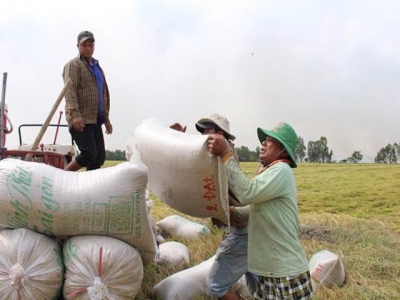China no longer largest buyer of Vietnam rice

CAN THO – China’s rice imports from Vietnam plummeted during the first few months of 2019, pushing it off Vietnam’s top rice consumers list.
Farmers harvest rice in the Mekong Delta region. China’s rice imports from Vietnam plummeted during the first few months of 2019, pushing it off Vietnam’s top rice consumers list – Photo: Trung Chanh
The latest report from the General Department of Vietnam Customs showed that in August, the country’s rice exports to China totaled 19,370 tons, worth US$14.3 million, dipping 67.4% in volume and 63.3% in value year-on-year.
In the year to August, some 347,520 tons of rice worth US$173.7 million had been shipped to China, slumping 67.8% in volume and 67.2% in value year-on-year.
The China-bound rice shipments accounted for a mere 7.6% of Vietnam’s January-August rice exports.
The sharp plunge in volume was attributed to China’s tightening control over informal imports and its strict conditions on the quality of imported rice.
For instance, rice bound for China must be sterilized for 120 hours; rice samples must be sent to Chinese agencies for testing; rice packaging and labels must display full information on product origins in line with international practices; and products must display the labs’ verification stamps.
These requirements have discouraged Vietnamese rice exporters from trading rice on the Chinese market. Only 20 firms meet its requirements for exporting rice formally, leading to a strong drop in rice shipments to China. As such, the northern neighbor is no longer Vietnam’s largest rice consumer.
Nguyen Dinh Bich, a rice market analyst, told The Saigon Times that the rice market will continue to face hardships for the rest of the year. The rice inventory on the global market remains high, whereas rice export prices are in decline.
Có thể bạn quan tâm
 Coffee export prices plummet
Coffee export prices plummet Although ranking second in the world, Việt Nam's coffee exports are plummeting.
 Đồng Tháp to flood rice fields for fertility, flushing crop disease pathogens
Đồng Tháp to flood rice fields for fertility, flushing crop disease pathogens The Cửu Long (Mekong Delta) province of Đồng Tháp plans to release floodwaters into 90,200ha of rice fields in this year’s rainy season to fertilise the soil
 Vietnamese pepper farmers struggle to survive
Vietnamese pepper farmers struggle to survive Price reductions, stiff competition and technical barriers are pushing the Vietnamese pepper industry against the wall.